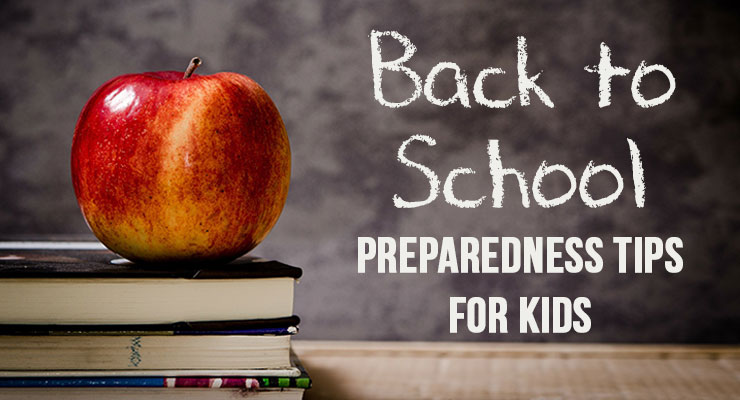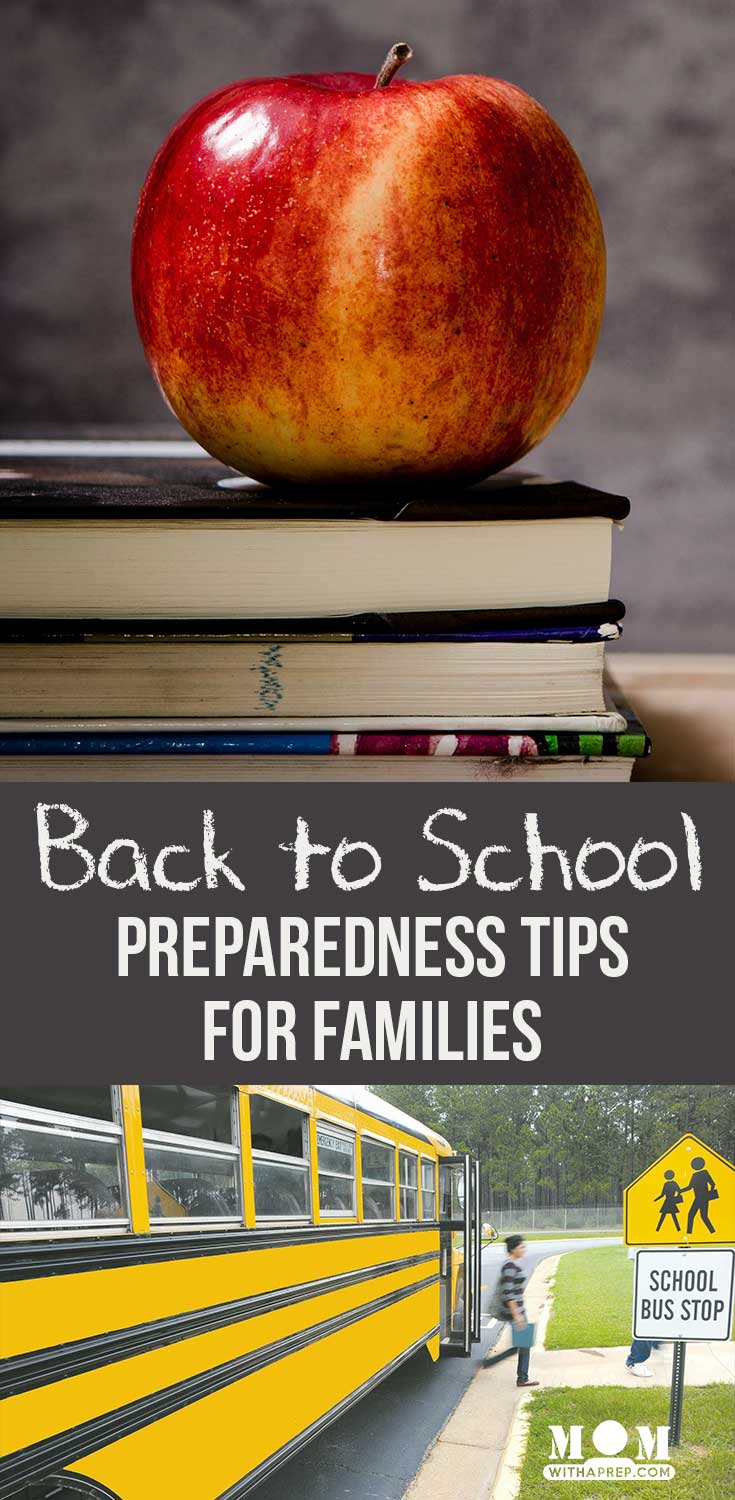It’s Back to School time – have you thought about common Preparedness & Safety Tips you need to have planned about before the school year starts?

10 Back to School Safety & Preparedness Tips
1. Know Your Emergency Stash
Whether you have a pack in their locker or something they carry in with them everyday, you should have a small pack available to your child that includes things they might need in case there is an emergency while they are in school and away from you. You can get a free printable checklist here.
• TIP: Consider a backpack with a separate storage pouch or bottom zippered compartment like this one for storing emergency supplies. You can use the zippered compartment to tuck away an emergency kit.
2. Know Your Password
Be sure you have a family password that you share only with those you hold dearest in taking care of your children in case there is an emergency and there are mix-ups about who is responsible for your children. Want to know more about family passwords? Check out this link to learn more.
3. Know Your Escape Plan
While most schools will have established protocols for getting kids to safety during emergencies (and if you don’t know what that policy is .. find out today!), you may want to talk about when it’s time to walk away and head home.
Especially for your older kids, make sure they have a place to rendezvous so that they can be together and head home. Make plans with trusted friends or neighbors about picking up kids together and getting them home if you work away from home. It might also be good to teach the kids an alternative pick up spot at the school if there is an emergency, and you want to get them quickly.
4. Know Your Contact Numbers
Whether your child is with another family on the way to school and are in a wreck, or separated on a field trip, or not with their teacher who has the class list, the possibility that your child is unable to tell emergency responders who he or she is can delay treatment or rescue.
• TIP: Consider a tag, a bracelet, a shoelace tag or other information for those children who may be too young to remember their names for fieldtrips and emergency health information.
5. Know Your School’s Emergency Plan
Ask the teacher and or school staff for a copy of their plan, find out what’s in the classroom for safety measures, and make sure the school has your phone numbers for contact. If you’re not happy with their emergency plan, help spearhead the PTA to make necessary changes.
• If you are a teacher with inadequate school emergency plans – learn how to create your own emergency bucket for classrooms here. (coming 8/5/2017)
6. Know Your Way Home
Get with your child and have a map printout of the area from school to home. Trace the routes for your child to use in case their way home is not available. Show approved and not approved ways home. This way, they have knowledge of alternative routes, and you know how they’ll be traveling. This also would apply to bus routes that your children may be on – know those routes.
7. Know Your Friends
Make sure that you teach your children who walk home who are their friends and who are not. Getting in cars with strangers is NEVER okay, nor is getting in cars of friends who don’t know your password – make sure your kids who are new to walking home know what is permitted. Walk with friends for safety.
8. Know When to Say No
Do your children know how to tell their friends no? Before and after school are prime times for kid to get in trouble from peer pressure and not knowing how to handle themselves in situations. Practice with your kids on ways to say no.
9. Know Your Home
Many children are latchkey kids at very young ages. If you find your family in the situation where your child spends significant amounts of time home, alone, be sure that you’ve gone through safety protocols, how to call emergency numbers, when to answer/not answer the door, basic first aid, etc.
• LEARN MORE: 10 Survival Skills Your 10 Year Old Should Know.
10. Know to Protect Yourself
Whether from bullies, strangers, etc., your children should know some basic self-defense skills and the safety tips to help them out of rough situations.
11. Communicate with your kids
Talk to your kids about the issues they have at school, the advice you’d give about staying safe (don’t assume they know), and keep a means of them to communicate with you. Even if they are too young to carry a cell phone (though cell phones are cheap now with $6/mo. plans for simple lines), include a walkie talkie to let them contact you on their way home if a need arises and you live within shouting distance of their school.
Do you have a tip you would add to the list?
Katy Willis is a writer, lifelong homesteader, and master herbalist, master gardener, and canine nutritionist. Katy is a preparedness expert and modern homesteader practicing everyday preparedness, sustainability, and a holistic lifestyle.
She knows how important it is to be prepared for whatever life throws at you, because you just never know what's coming. And preparedness helps you give your family the best chance to thrive in any situation.
Katy is passionate about living naturally, growing food, keeping livestock, foraging, and making and using herbal remedies. Katy is an experienced herbalist and a member of the CMA (Complementary Medical Association).
Her preparedness skills go beyond just being "ready", she's ready to survive the initial disaster, and thrive afterward, too. She grows 100% organic food on roughly 15 acres and raises goats, chickens, and ducks. She also lovingly tends her orchard, where she grows many different fruit trees. And, because she likes to know exactly what she's feeding her family, she's a seasoned from-scratch cook and gluten-free baker.
Katy teaches foraging and environmental education classes, too, including self-sufficient living, modern homesteading, seed saving, and organic vegetable gardening.
Katy helps others learn forgotten skills, including basic survival skills and self-reliance.
She's been published on sites such as MSN, Angi, Home Advisor, Family Handyman, Wealth of Geeks, Readers Digest, and more.


